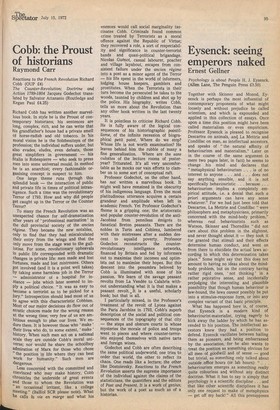Cobb: the Proust of historians
Raymond Carr
Reactions to the French Revolution Richard Cobb (OUP £4) The Counter-Revolution: Doctrine and Action 1789-1804 Jacques Godechot translated by Salvator Attanasio (Routledge and Regan Paul £4.25) Richard Cobb has written another marvellous book. In style he is the Proust of contemporary historians; his sentences are long, complex, rich, and he can write that his grandfather's house had a private smell of horse-radish and old tobacco. In 'his moral vision he is the Solzhenitsyn of the profession; the individual suffers under, but also evades, eludes, even defeats, those great simplifiers in government — his Stalin is Robespierre — who seek to press men into some universal mould. In method he is an anarchist; every fashionable organising concept is suspect to him.
One large theme runs through this Splendid book — the interaction of public and private life in times of political intransigence. Such a time was the revolutionary Terror of 1793. How and why did people get caught up in the Terror or the Counter Terror? .
To many the French Revolution was an unexpected chance for self-dramatisation after years of 'professional marination ' in the dull provincial society of the ancien regime. They became the new notables, only to find that they had miscalculated their entry from the wings and that the only move from the stage was to the guillotine. For some, revolutionary upheavals in public life corresponded with dramatic changes in private life: men made and lost fortunes, made and lost mistresses. Others got involved (and it is a point well taken) by taking some harmless job in the Terror — administrator of a hospital for instance — jobs which later seemed to imply a political choice. "It was as easy to become a terrorist as to be picked for a jury." Introspection should lead most of us to agree with this c'haracteristic Cobbism. Most of our major decisions do flow out of erratic choices made for the wrong reason at the wrong time; very few of us are ambitious enough to plan our lives. We endure them, It is however those who ' make ' their lives who do, to some extent, ' make ' history. When such men act on a national scale they are outside Cobb's moral universe; nor would he share the schoolboy admiration of Marx for those who chose " the position in life where they can best work for humanity." Such men are dangerous.
Less concerned with the committed and convinced who may make history, Cobb chronicles the underside of great events Land those to whom the Revolution was '' an occasional irritant, like a college meeting." (Balliol SCR please note). What he calls la vie en marge and what his enemies would call social marginality tascinates Cobb. Criminals found common crime treated by Terrorists as a moral offence against the Republic of Virtue; they recovered a role, a sort of respectability and significance in counter-terrorist bands and quasi-political brigandage. Nicolas Guenot, casual labourer, poacher and village layabout, escapes from consistent failure under the ancien regime into a post as a minor agent of the Terror — his life spent in the world of informers, lodging house keepers, gamblers and prostitutes. When the Terrorists in their turn become the persecuted he takes to the woods, taunted by children and shot up by the police. His biography, writes Cobb, tells us more about the Revolution than any other book written in the last twenty years.
It is pointless to criticise Richard Cobb. He is fully aware of the logical consequences of his historiographic pointillisme, of the infinite recession of biographical petit point. Where do we stop? Whose life is not worth examination? He leaves behind him the rubble of many a fine generalisation. Where are the sans culottes of the lecture rooms of yesteryear? Triturated. It's all very uncomfortable as he mocks our vain efforts to clamber on to some sort of conceptual raft.
Professor Godechot, on the other hand, has not written a marvellous book. It might well have remained in the obscurity of his indigenous language. Even the most platitudinous utterance acquires a certain grandeur and amplitude when left in academic French. Yet Professor Godechot's theme is a gripping one; the aristocratic and popular counter-revolution of the antiJacobins from penniless emigres to fanatical Breton peasants. There are the nobles in Turin and Coblenz, lumbered with their mistresses after a sudden descent to squalid poverty. Professor Godechot reconstructs the counter revolutionary intelligence networks, financed by Britain and fed by informers out to maximise their incomes and optimists out to maximise their hopes. But this descent into the penumbra beloved by Cobb is illuminated with none of his passion. We learn of the savage peasant revolts from La Vendee to Calabria without understanding what it is that makes a peasant revolt..It is a useful, scholarly book; but that is all.
I particularly missed, in the Professor's treatment of the revolt of Lyons against the Paris Jacobins in 1793, Cobb's superb description of the social and political consequences of the topography of that city — the steps and obscure courts in whose mysteries the morale of police and troops went to pieces and where counter-terrorists enjoyed themselves with native tarts and foreign wines.
Godechot and Cobb are often describing the same political underworld; one tries to order that world, the other to reflect its chaos. One reads like a lecture; the other like Dostoievsky. Reactions to the French Revolution asserts the supreme importance of the individual against the claims of the statisticians, the quantifiers and the editors of Past and Present. It is a work of genius; but the work of a poet as much as of a historian.










































 Previous page
Previous page